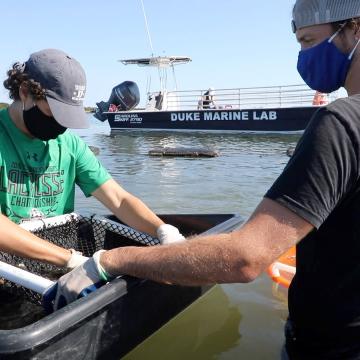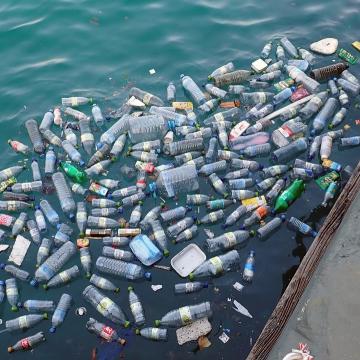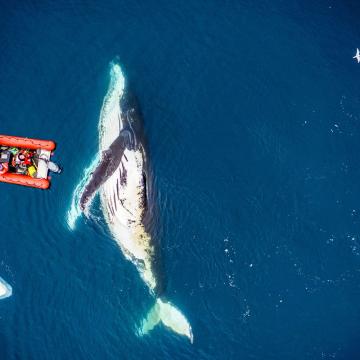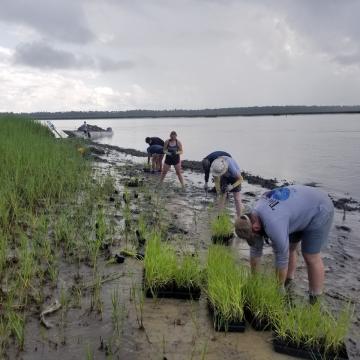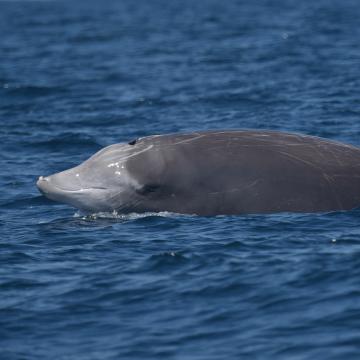-
NewsThe Duke Aquafarm is Duke’s other “campus farm,” where students grow oysters instead of produce and learn how the tasty bivalves could help take a bite out of coastal pollution.
-
NewsThe WildTrack Specialist Group, a global network of biologists and conservationists dedicated to using only non-invasive techniques to monitor and protect endangered species, will be launched April 22 to celebrate Earth Day.
-
NewsA new study shows that after listening to student presentations or watching student-produced videos about ocean plastics pollution and other garbage in North Carolina waters, local officials and voters reported feeling greater concern about the issue.
-
NewsOcean mammals are at a crossroads, with some species at risk of extinction and others showing signs of recovery, a new study by an international team of researchers shows.
-
NewsA new $411,000 grant from the U.S. Department of Defense’s Strategic Environmental Research and Development Program (SERDP) is funding a four-year study by Duke University researchers to better understand the cumulative effects of human and natural stresses on critically endangered North Atlantic right whales.
-
NewsHarnessing the power of artificial intelligence, satellites and field observations, Duke researchers have produced new estimates of how much photosynthesis and primary production – key components in the global carbon cycle – are occurring in Earth’s oceans, and how these processes may be changing in response to a changing climate.
-
NewsPolicies that more strongly recognize the value of sustainable seafood as a source of nutrition, not just a source of livelihoods, could strengthen global food security and help take a big bite out of world hunger, a new analysis by an international team of experts shows.
-
NewsA new paper outlines some of the greatest coastal restoration successes in recent decades and identifies lessons we can learn from them to protect and restore similar environments worldwide.
-
NewsResearchers have used automatic identification systems (AIS) satellite data and other spatial analysis tools to identify more than 1,000 companies that fish in the high seas—waters that lie outside national jurisdiction where fishing has raised fears about environmental and labor violations.
-
NewsDuke University researchers have created a new online resource designed to help local governments, conservation groups, businesses and other stakeholders identify the best technologies to clean up plastic pollution in our oceans or prevent it from getting there in the first place.
-
NewsThe National Science Foundation has awarded Dana Hunt, associate professor of microbial ecology, a $299,693 grant to support research on how hurricanes and other disturbances shape microbial productivity and function in the oceans.
-
NewsIn 2017, a Cuvier’s beaked whale that had been tagged by a team of Duke University marine scientists dove deep into the waters off Cape Hatteras, N.C, and stayed below the surface for 3 hours and 42 minutes before coming up for air – making it the longest whale dive ever recorded.
-
NewsActing like high-rise timeshares in the sea, shipwrecks and other artificial reefs can support dense populations of sharks, mackerels, barracudas, jacks and other large migratory marine predators essential to ocean health, according to a new study at 30 sites along the North Carolina coast.
-
NewsInteractive software that “reads” and analyzes footprints left by black rhinoceroses can be used to monitor the movements of the animals in the wild, giving conservationists a new way to keep watch on the endangered species and help keep it safe from poachers, according to a Duke University-led study.
-
NewsA new study finds that dolphin-viewing tours are more profitable than tours where customers can swim with the animals – a much more disruptive option that can deprive spinner dolphins of rest and inhibit their ability to avoid predators while foraging in nearby waters at night.
